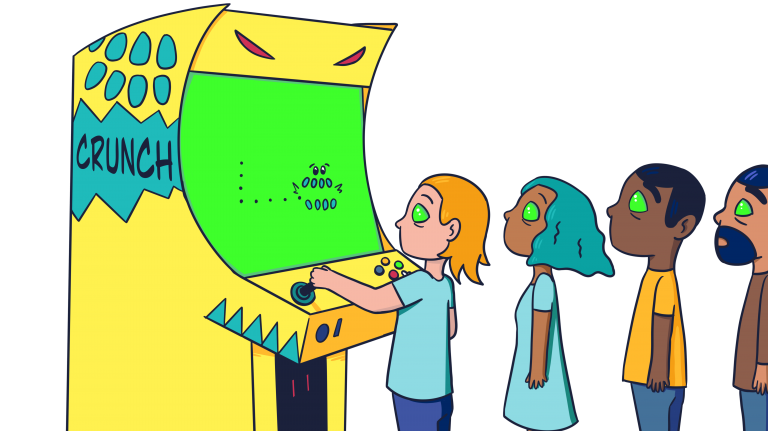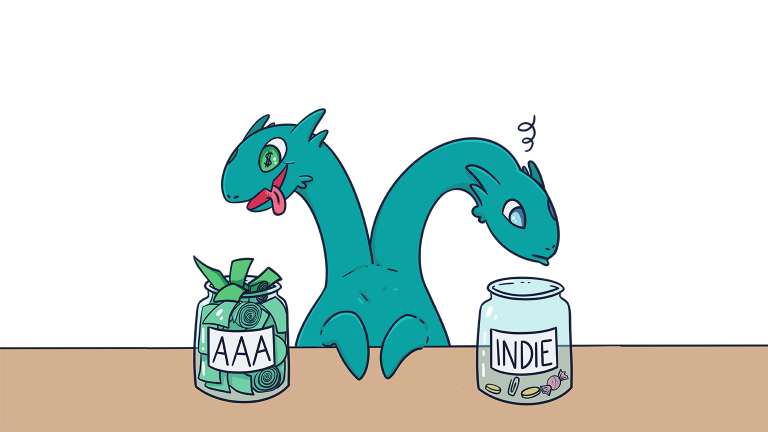Guidelines and Best Practices for Crunching Ethically
At Tiny Hydra, we believe that Crunch should be avoided at all costs. With proper planning and vigilance, it can be in many cases. However, we recognize that disasters happen and even the best of intentions can’t always protect a game from last-minute upsets. Game engine updates break your code, global pandemics torpedo your best-laid plans, people get awesome offers from new startups co-founded by the former CEO of a super successful developer that rhymes with gizzard. Shit happens.
If you do find yourself having to Crunch for reasons outside your control, we hope you will try to do so as ethically as possible. To help with this, we’ve tried to lay down some guidelines and best practices to follow which will minimize the negative effect that Crunch can have on your company.
Before we do that though, let’s just quickly review what Crunch is, so everyone’s on the same page.
What is Crunch?
Crunch is the practice of having one or more people involved in the development of a game work excessive overtime, sometimes over 100-hours per-week, typically unpaid. Crunch usually happens as teams approach a major milestone or the delivery of a game.
It is a widespread blight on the games industry, and if you want to read more about it you can do so here.
Guidelines
These guidelines are for anyone in the position to decide if their team should Crunch and how. They are aimed at helping ensure equitable and respectful treatment of teams in the event that Crunch cannot be avoided. We recommend you follow as many of these guidelines as possible. Even if it is not possible to follow all of them to the letter, the more you adhere to the better.
If you are a solo developer or a small team, many of these guidelines are still relevant. Especially the ones aimed at preserving your health.
Make Crunch Optional
There is no reason that anyone should be forced to decide between crunching and losing their job. As often as people like to point to games being a passion-driven industry, where everyone is there to do the thing they love, that is not true in every case. And even if it were, peoples love and passion for making games can be ruined when they feel trapped and helpless.
You may find yourself in an unfavorable and stressful situation, and it’s likely your team will be feeling this tension too. However, it’s important to remember that your team was hired on merit and they deserve respect for how far you’ve come, regardless of how things are currently turning out.. They should definitely not be judged harshly if Crunch becomes unavoidable or punished for being unwilling to put their own health and relationships with their loved ones on the line in order to release a game on time.
Be aware that even if you do not actively force people to Crunch, they may still feel pressured to do so. It is important for leaders to discourage a culture of peer pressure that makes your employees feel like the success or failure of a game is on their shoulders. The reality is, it was often poor choices on someone else’s part that resulted in a need to Crunch, and leaders need the goodwill of their team to solve those issues. Now is the time, more than ever, for everyone to be on board and heading in the same direction.
Keep Crunch Periods Short
The shorter you can keep your Crunch period, the better. We are talking days or weeks, but not months.
If you find yourself resigned to crunching for the next 6 months, something has gone horribly wrong and it almost certainly could have been avoided. If you are considering this, don’t. It is nearly always better to delay your launch, secure more funding, or make hard cuts to your game. Sustained periods of Crunch pose a huge risk to the physical and mental health of your team.
Do not justify long-term Crunch by suspending it for short periods of time or giving your employees a day or two to ‘unwind’. Burnout can take a long time to recover from and you cannot keep morale high by telling your employees they can stop pushing the boulder uphill for a little while. The boulder is still there and your employees know it. If you have to Crunch for a long period, it’s a good idea to institute “shifts” so everyone knows they won’t have to work multiple weeks without any time off.
Be Transparent
It will be easier to get your team to buy into Crunching, and morale will be higher if you are transparent and honest. Tell your team why it is necessary to Crunch and apologize for letting it get to this point. Yeah, we know lawyers and C-suite coaches tell you never to apologize, but the reality is teams need their leaders to be human beings who admit flaws and share the load. One of the most straightforward ways to make Crunch manageable is to be upfront about how long it will take. “We need to Crunch for six weeks.” is a whole lot easier to digest than “We have to Crunch until the job is done.”
Whatever you do, don’t promise them that you will not need to Crunch when you know you will. You may think that you are protecting their morale and keeping them productive, but you are playing the short game. In the long-run, the damage will be greater. They will either realize you lied to them or they will think you are incompetent. Either way, you lose the trust of your team.
Avoid Layoffs
This is closely linked with the previous point. Do not hire full-time employees you know will need to be “let go”. For that matter, try to avoid firing your original full-time employees after the game is shipped.
Part of planning a game includes knowing how many people you will need and for how long. Be transparent and set contracts to the appropriate length at the outset. If your planning is faulty, and you end up having to Crunch because you are short-handed. Don’t add insult to injury by making your employees Crunch, only to pull the rug from under them at the last second.
Lead From the Front
The fastest way to lose the respect of your team is to make them feel like they are struggling alone. The requirements of each role is different and no one expects the CEO to spend every night coding. But, your team should have the sense that you are working just as hard as them and that if you need to, you would roll up your sleeves and get your hands dirty.
Even doing something as simple as bringing donuts into the office for lunch or offering to get people coffee while they work can be the difference between your team feeling like you are ‘on their side’ or not.
The truth is, many will be willing to go above and beyond if they respect you and feel like they are being respected. For an example outside of the games industry, take a look at Dan Price (CEO of Gravity Payments) Dan raised the minimum wage of his employees to $70.000 and cut his own pay by over a million. His employee’s productivity increased hugely as a result. You don’t have to do anything quite as drastic as that but you might be surprised how little is needed for your team to look to you as a leader, rather than a manager.
And I speak from experience when I say, please, do not go on vacation while your team is working itself ragged. It’s not a good look.
Pay Overtime
Make sure that any extra work that your employees do is compensated. Ideally with extra pay for overtime worked. Our suggestion for a standard 40-hour contract would be:
1.5x for >40 – 60 hours per week
2x for >60-80 hours per week
2.5x for >80-100 hours per week
We highly recommend capping at a maximum of 100 hours per week in a 7 day work week situation (80 in a 5 day work week). We also recommend not allowing team members to work more than 12 days in a row. Make sure to consult your local labor laws before making any decisions on overtime pay.
If it is not possible to directly pay overtime, such as if a limited budget is the reason you are Crunching in the first place, find alternative ways to compensate your workers. Examples include:
- Paid time-off at 1:1 for every hour of overtime worked
- A bonus upon the release of the game
- A share of the profits your game will generate
- Accelerated vesting of equity in the company
- Issuing new equity-based compensation.
Even just catering all meals will help.
It is important not to fall into the trap of using the fact you are following this guideline to justify discarding the rest. Compensating equitably for Crunching is a good start but it means very little if employees are doing it against their will or if they are likely to lose their job soon after.
Safeguard Your Employees Health
This guideline may be last but it is perhaps the most important. By Crunching, you are putting your employees at risk of suffering mental and physical injury. You should do everything you can to protect them.
One of the first things that usually goes out the window during Crunch is sleep. Don’t let this happen. Make sure all your people are getting a decent amount of sleep. A 20 minute power nap on a couch in the break room doesn’t count. If members of your team have commutes that are eating into their down time, offer them a hotel room near the office. If they are staying at the office for 48 or 72 hours at a time, ensure that they go home or to a hotel as soon as possible. Extended periods without sleep can and will wreak havoc on your team’s health.
Make as many resources available to them as possible. Do people on your team have kids? Can you pay for daycare? Check-in with them regularly and if things start to go south, give them the support they need. And an absolute must is making sure they have access to healthcare so if the worst does happen, they have a pathway back to health.
We hope you find these guidelines helpful. If you have any questions about them, or you want our help avoiding crunch completely, feel free to get in touch.






